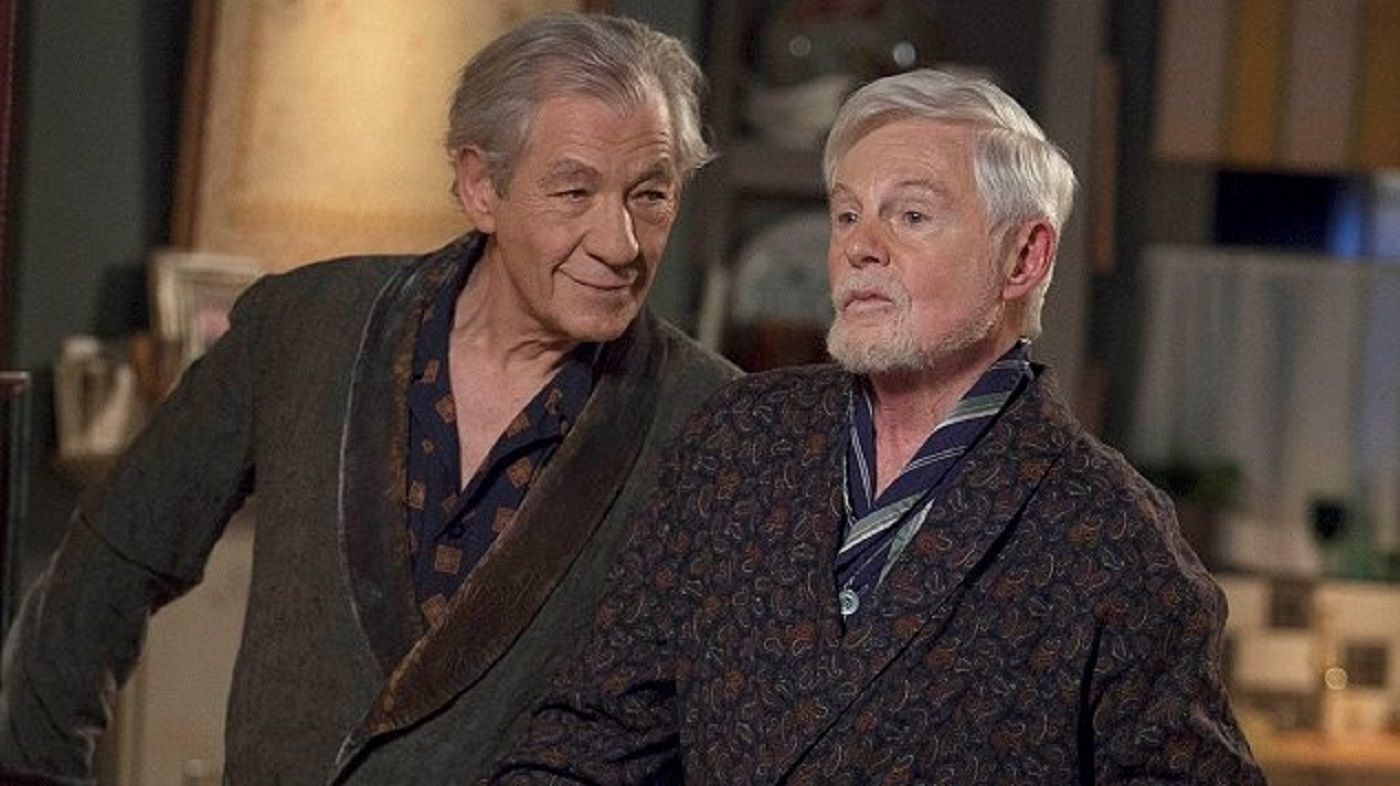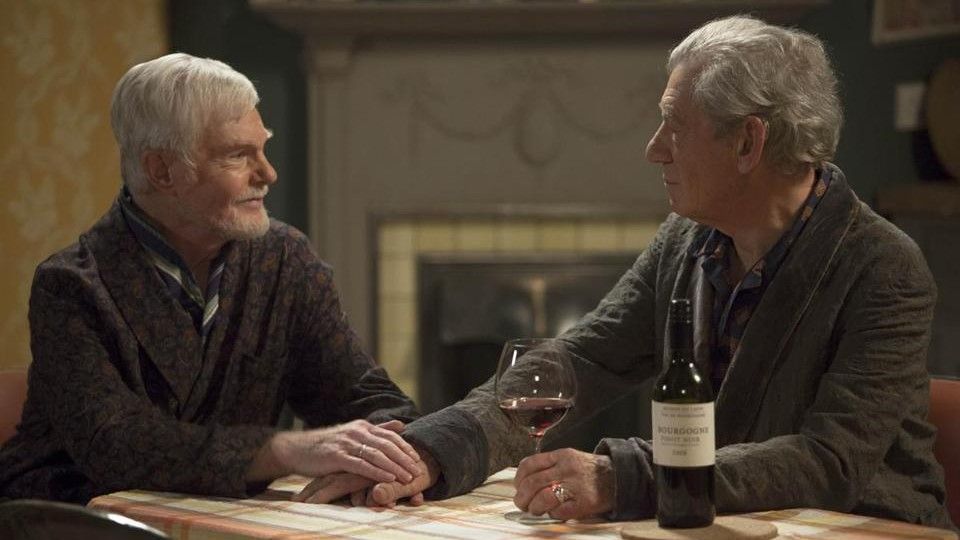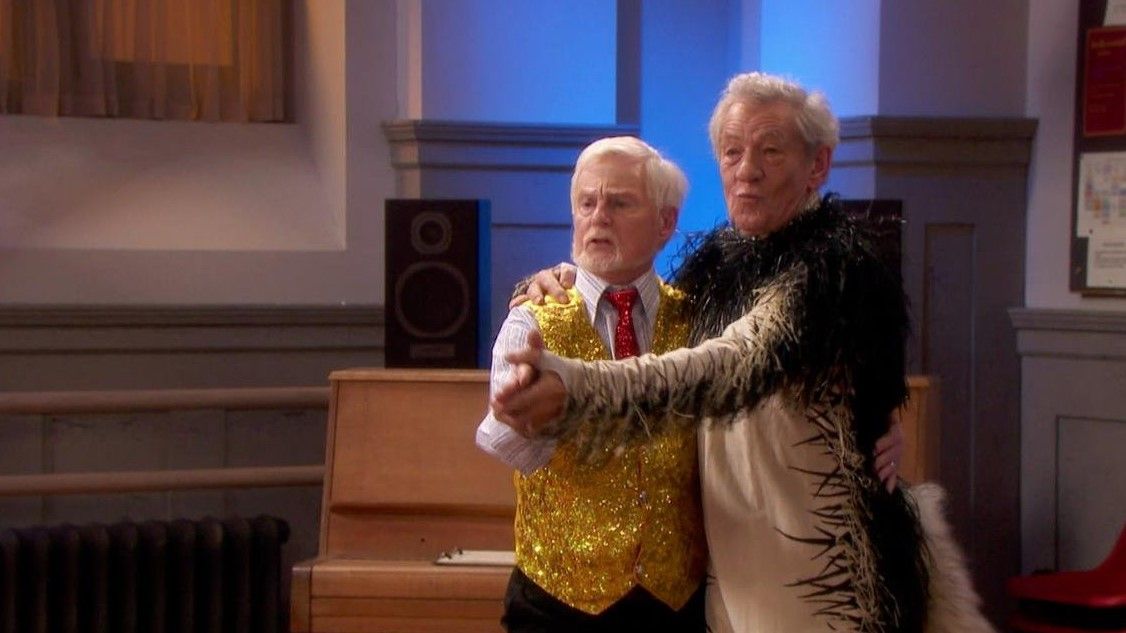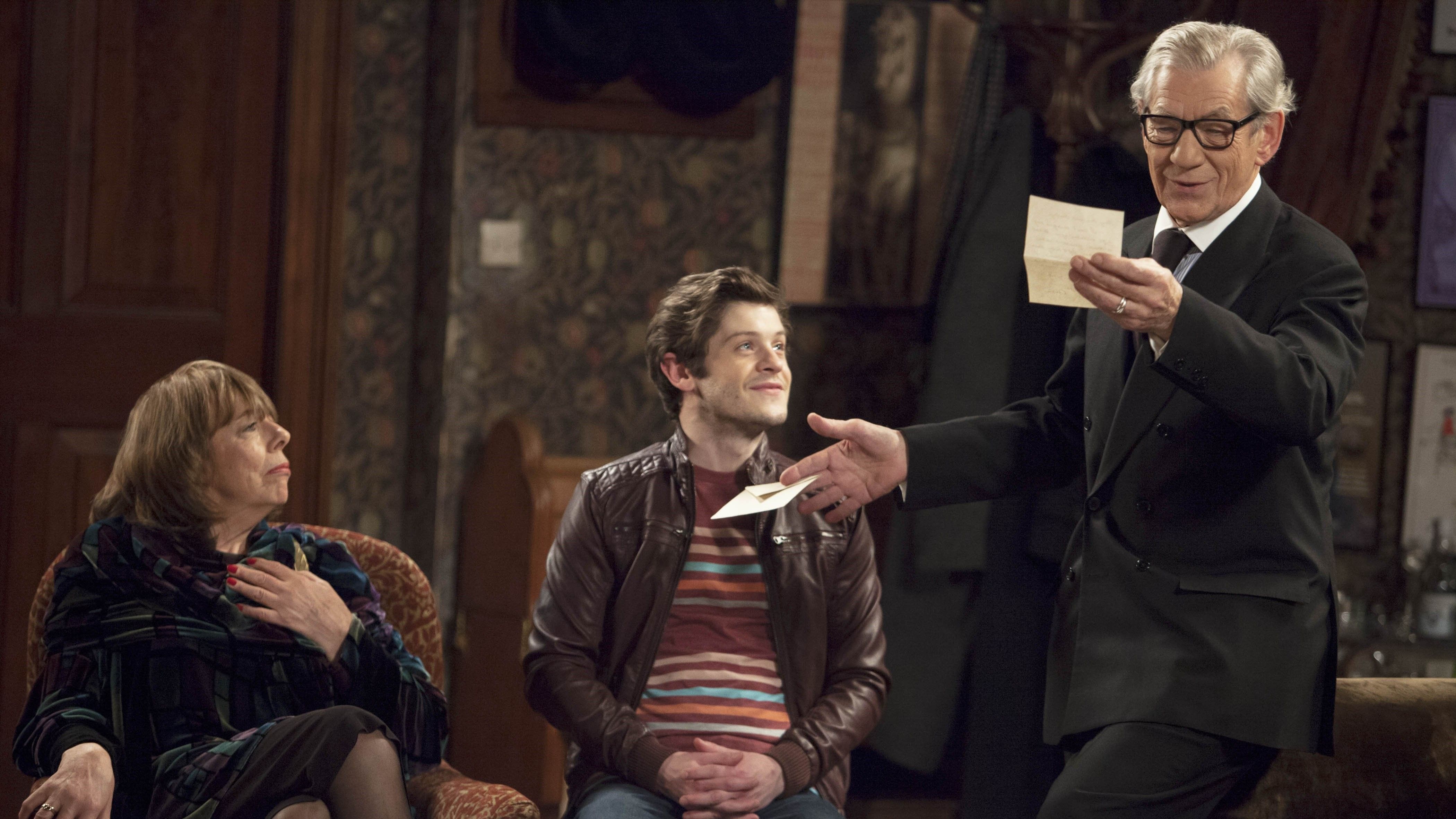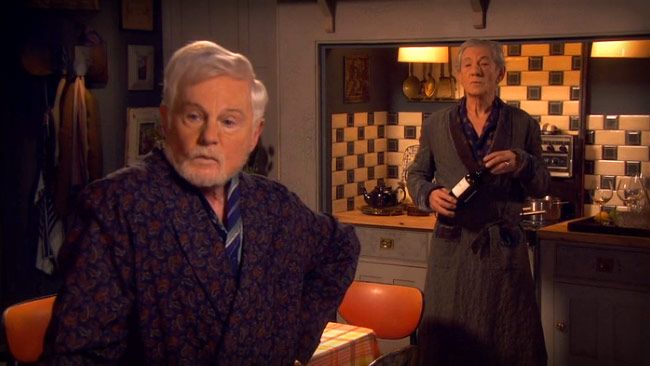Sir Ian McKellen is a powerhouse of an actor, with seven decades of roles on stage, and in TV and movies. Though he is an openly gay actor and an LGBTQ advocate, Sir Ian has only played a handful of gay characters. There's X-Men (2000), where Magneto’s extremism for the mutant agenda got queer-coded. In Gods and Monsters (1998), he portrayed openly gay horror director James Whales as he succumbed to past trauma. So it’s refreshing to watch British sitcom Vicious with McKellen playing what could be a quintessential role. Since the show isn't well-known, that proclamation might sound embellished. But once you see McKellen’s performance, full of flamboyant cockiness, it's an extension to the legacy of this actor’s long-running LGBTQ advocacy.
From co-creator and writer Gary Janetti, Vicious tells the everyday life of Freddie Thornhill (McKellen) and Stuart Bixby (Sir Derek Jacobi), a couple who have been together for 50 years. A small-time actor, Freddie recounts career-defining roles off his resume to whomever will listen, like a one-episode stint as a butler for Downton Abbey. Two episodes if you count his arm being in a later shot.
This mostly falls upon the ears of Stuart and their four friends: new apartment tenant, Ash (Iwan Rheon), young and uncertain of what to make of his life; Violet (Frances de la Tour), a lifelong friend to Freddie and Stuart and despite feeling very lustful, not lucky with men; the constantly confused Penelope (Marcia Warren); and the grumpy Mason (Philip Voss). The friends are constantly on the sidelines as the main couple bicker, a main ingredient to the show. Freddie is under constant annoyance whenever Stuart’s mother is brought up, primarily because her son has yet to come out, still referring to Freddie as a flatmate. “If you waited any longer, we’d have to dig her up to tell her,” Freddie puts it. Another time, Stuart is busy on his feet while Freddie lounges on the couch. “Oh no, I don’t need any help preparing for the party,” Stuart tells him, “Thank you so much for offering, you big bitch!”
In the limited span of 14 episodes, Freddie re-experiences life with his long-suffering boyfriend, including clubbing, going to the gym, and ballroom dancing. In all of those situations, Freddie usually attempts to make it all about himself. When someone buys him a drink at the bar, Freddie is elated at regaining his “youthfulness.” At the gym, Freddie pushes his body to the limit to show off. By the time ballroom dancing comes up, Freddie is sternly rejective to it, mostly due to not getting it right. Of course, he eventually shows up for Stuart. And that's because the two are inseparable. Freddie might be the first to point out how Stuart hasn’t conquered all of life’s achievements, but neither has Freddie. Wishing to flaunt celebrity friends from his acting career, Freddie makes a big show of ringing up Dame Judi Dench. But Stuart knows he’s full of crap. The last time Freddie and the Dame shared the screen was in a Smarties commercial decades ago. Freddie isn’t above poking fun at himself, however. “I was doing my vocal exercises and a tooth came out,” he says to Stuart, propping his mouth open, “I’ve shoved a peppermint in there instead. Can you tell?”
It's all very campy and that's on purpose. On Vicious, artificialness is made authentic. The flat Freddie and Stuart live in is ornate, theatrical even. The wallpaper is decadent, the window curtains running the length of the cathedral ceilings. There is hardly an empty spot that isn’t covered up with a painting or a trinket. Everything is so grand. Having a more conservative interior design wouldn’t come close to representing this couple. During the first season, J. Bryan Lowder of Slate focused on the bickering between the two, writing, “Camp allows them to exercise their inevitable disappointment with the human condition — whether over physical aging, personal shortcomings, or roads not taken — in the open air, in a stylized game that is both refreshingly frivolous and deeply serious, such that it does not curdle into something truly threatening.”
For how extravagant they are, their living space is reflective of that. Camp is so embedded into the show, the opening theme is the get up-and-dance “Never Can Say Goodbye” from The Communards, a queer pop-duo from the ‘80s. Speaking to Collider, McKellen explained that as traditional as Vicious might seem, at least in the situational comedy gags and the multi-camera setup, it’s also atypical in a major way. “In those old-fashioned sitcoms, to be gay was, in itself, funny, and you laughed at the characters rather than with them," he said. "This is not true of this show. I don’t think Derek and I would have wanted to be involved in this, if it had been old-fashioned, in that sense. We don’t get laughs as Freddie and Stuart because we are gay, but because we are the people who we are. That’s the crucial difference." Freddie and Stuart can simply be themselves. They can be at each other's throats, call it a night, and go to bed together.
It isn’t all laughs. There are poignant moments. From the jumbled up mind of their friend Penelope, during lucid moments she shares a fear of losing her memory. When Ash has a chance to head to New York to properly start his life, he doesn’t feel like he deserves the opportunity. When Stuart’s mother passes away, he almost forgets. Later, he goes to call her like he always does, her death hitting him then. He sobs, and Freddie is there to comfort him. There’s a fragility to life at their age, and Vicious doesn’t ignore it. It’s just that the show can still go broad, such as the men making sure their elderly dog Balthazar is alive by spraying the old pup with the kitchen’s faucet sprayer. When they unite against someone, they’re formidable. A discussion between them while at a restaurant is interrupted by a waiter, who they criticize into getting a free appetizer. At their later-in-life wedding, Violet shows up wearing a white gown, very much looking like the bride. Freddie takes one look, and turns to Stuart: “What the fuck is she wearing?”
The wedding brings a new layer to their relationship when it happens in Season 2. Tensions bubble up with the days counting down to the ceremony. For Stuart, he worries about the aftermath. Will being able to legally marry void the last five decades? Freddie doesn’t think so. He comforts his lover, friend, and supporter. There is only one glimpse into the past and that it’s only a glimpse makes all the difference. After they reconcile, a flashback shows a young Freddie (Luke Treadaway) and Stuart (Samuel Barnett) having just moved into the flat. They fall into routines they will carry over into the present. Had Vicious revolved around these younger counterparts, the show would have become entirely different. The veteran actors sell audiences on the length to their relationship.
Freddie and Stuart don’t travel all that much, having stayed in their part of London since, well, forever. That fixed state means they lived through the AIDS epidemic and heterosexual fears and anxieties which pushed anti-gay policies. Margaret Thatcher, the Prime Minister of the time, did her part to cause chaos for the LGBTQ community, something McKellen was personally affected by in reality. From a personal blog, the actor put down his thoughts when Thatcher died in 2013. On discussing the much maligned Section 28, or Clause 28, “Lest we forget, this nasty, brutish and short measure of the third Thatcher administration, was designed to slander homosexuality, by prohibiting state schools from discussing positively gay people and our "pretended family relations".” To oppose it, McKellen publicly came out against it on BBC radio in 1988, both in political belief and sexuality. It turned him into the advocate he remains today. On The Jonathan Ross Show, McKellen discussed the relief he felt after doing so, saying, “I [have] never stopped talking about it since. Made up for lost time. It changes your life utterly. I discovered myself. And everything was better. My relationships with my family, with friends, with strangers, and my work got better as I wasn’t hiding anymore.”
For the male scene partners McKellen has had, from Sir Patrick Stewart to Elijah Wood, having Jacobi (an openly gay actor, too) be attached to his hip makes Vicious earn a unique place in queer pop culture and representation. Freddie and Stuart are well past their 60s — never mind that Freddie believes he could pass for 50 at an audition. They are, much like the actors, full of history. There's an additional irony in that McKellen doesn’t necessarily believe queer characters should be played by queer actors. "Is the argument that a straight man cannot play a gay part, and, if so, does that mean I can't play straight parts, and I'm not allowed to explore the fascinating subject of heterosexuality in Macbeth?"
And yet, because McKellen hasn’t played too many roles that matched his sexuality, there’s something special in seeing him as Freddie, a character not queer-coded or in pain, using his theater background to pull laughs out of the live audience.

